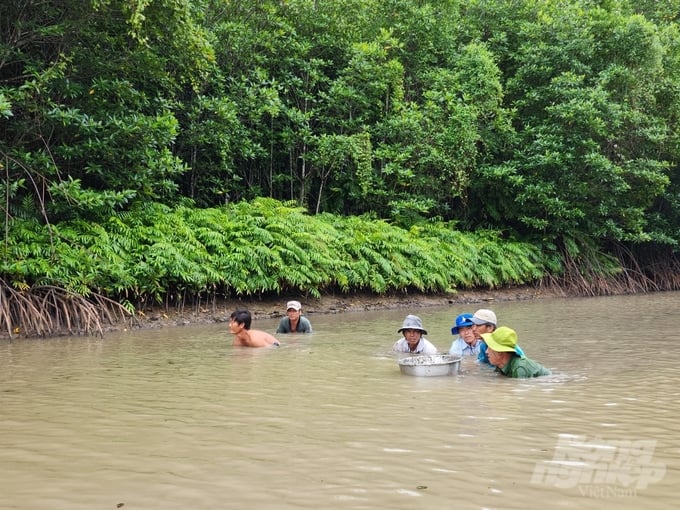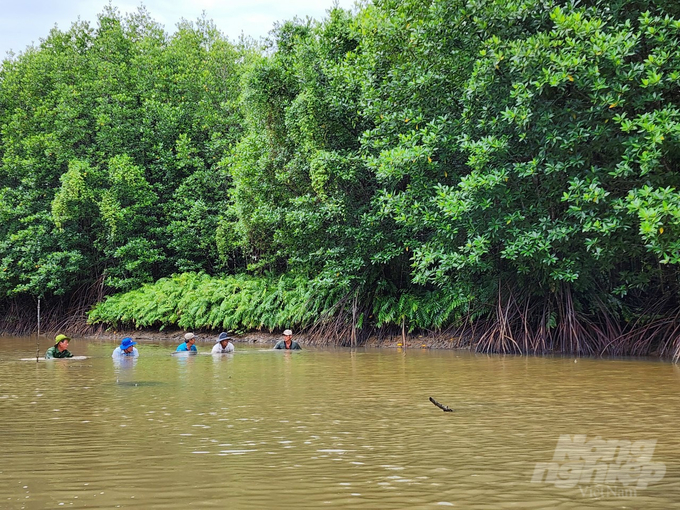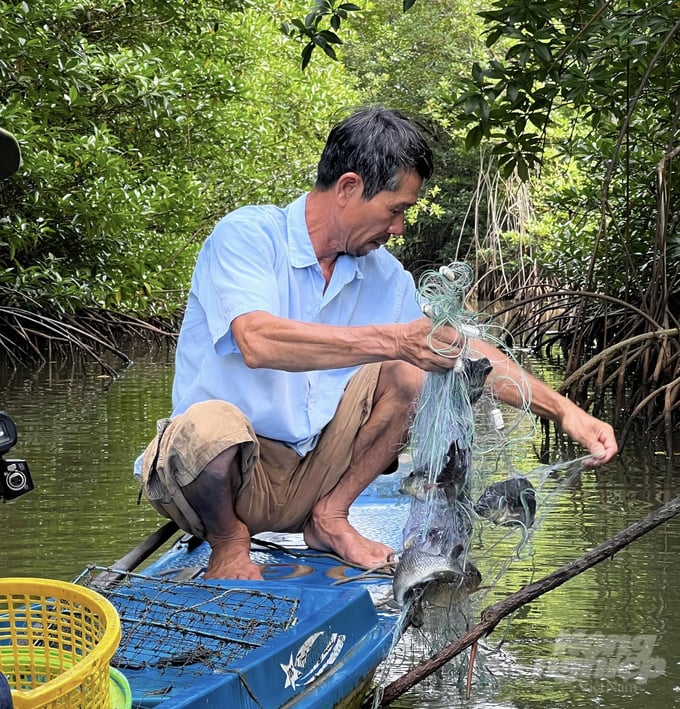December 8, 2025 | 07:25 GMT +7
December 8, 2025 | 07:25 GMT +7
Hotline: 0913.378.918
December 8, 2025 | 07:25 GMT +7
Hotline: 0913.378.918

Residents of Ngoc Hien district make a living under the canopy of mangrove forests. Photo: Trong Linh.
Ca Mau province has a total of 35,000 ha of mangrove forests, primarily concentrated in Nam Can and Ngoc Hien districts. With a remarkably rich and diverse ecosystem under the mangrove canopy, the aquaculture sector in Ca Mau has seen significant growth in recent years, focusing on multi-layered, multi-value, and nature-friendly models.
Among these, economic models under the forest canopy, such as shrimp-forest and shrimp-forest combined with crab, blood cockle, and clam farming..., have been thriving. These models provide residents with stable incomes while allowing them to collaborate with local authorities in protecting forested areas.
Minh Phu Forest Shrimp Chain Social Joint Stock Company, part of Minh Phu Seafood Group, was the pioneer in establishing organic and ecological shrimp farming projects starting in 2013. By early 2017, Minh Phu Forest Shrimp Chain Social Joint Stock Company was officially founded with a mission to support society and the environment within the mangrove forests of Ngoc Hien district.

With the forest shrimp farming model, residents achieve sustainable economic development while effectively protecting forests. Photo: Trong Linh.
Mr Hua Van Thon, 54, residing in Vien An Dong commune, Ngoc Hien district, shared that with over 3 ha of ecological forest shrimp farming, he not only earns 10–20% higher profits compared to traditional farming methods but also ensures absolute safety. "This is the most leisurely job because it requires almost no machinery or heavy labour," he said, noting that his stable income from shrimp farming ranges from VND 150 - 200 million/year.
Mr. Duong Vu Phong, Project Manager of Minh Phu Forest Shrimp Chain Social Joint Stock Company, stated that the certified ecological forest shrimp farming area has expanded by 1,400 ha, with over 300 new households joining. This brings the total ecological forest shrimp farming area to nearly 11,400 ha, involving over 2,300 farming households. Key areas include the three focal communes of Vien An, Vien An Dong, and Dat Mui (under the Dat Mui Forest Management Board).

According to evaluations, the forest shrimp farming model yields an average profit of about VND 80 million/ha/year for farmers. Photo: Trong Linh.
Mr Phan Hoang Vu, Director of Ca Mau's Department of Agriculture and Rural Development (DARD), remarked, "Farmers raising shrimp under mangrove forests in districts such as Nam Can and Ngoc Hien have been very successful, with an average profit of around VND 80 million/ha annually".
The development of the ecological shrimp farming model demonstrates a harmonious approach to economic growth and environmental protection by maintaining the balance of aquatic ecosystems beneath the forest canopy. Participants in the model are required to plant and harvest forests while ensuring the regulated forest coverage ratio over their farming area.
Translated by Hoang Duy

(VAN) At the TARASA25 Conference, participating countries shared experiences on implementing agroecology and regenerative agriculture, contributing to a sustainable transformation of food and agriculture systems.

(VAN) Green industry is becoming a driving force for the development of Hue City, not only promoting economic growth but also protecting the environment, creating the foundation for the Net Zero goal.

(VAN) As of 2025, the ASEAN region has a total of 69 ASEAN Heritage Parks recognized across its 10 member states. Among them, Viet Nam contributes 15 ASEAN Heritage Parks.

(VAN) Yok Don National Park has high biodiversity with numerous endemic plant and animal species, and it is also the only dipterocarp forest ecosystem conservation area in Viet Nam.

(VAN) Viet Nam and Brunei signed two important MOUs on fisheries and IUU, expanding cooperation in agriculture, the environment, and Halal exports, aiming to substantively implement joint projects.

(VAN) The Viet Nam Coconut Association worked with the International Finance Corporation (IFC) and businesses to promote the supply chain, enhance competitiveness, and develop the coconut industry sustainably.
![Hue aims for Net Zero: [2] Pioneering low-emission tourism](https://t.ex-cdn.com/nongnghiepmoitruong.vn/608w/files/huytd/2025/12/04/0633-dulichzero-4-095634_236-161125.jpg)
(VAN) The ancient capital of Hue has developed Net Zero tourism products and models, aiming to reduce carbon emissions and pioneer the establishment of Viet Nam's green tourism destination.